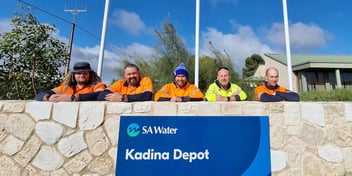Unlocking increased productivity, cost savings and work satisfaction through safety decluttering
Logan Water and Principal Contractor, Downer, have partnered with Griffith University’s Safety Science Innovation Lab to undertake a two-staged, Safety Decluttering research project, in consultation with their construction contractors. The key question to solve using an evidence-based approach was ‘do our multiple levels of safety policies, documents, forms, procedures and processes help to keep people safe, or hinder our efforts?’. There are many beneficial lessons learned from the research findings, which have the potential to be extended to the water industry, and the wider, infrastructure development industry.
Logan Water and Principal Contractor, Downer, have long valued the safety of their workforces, including the contractor crews who work on Logan Water projects across Logan City in south east Queensland. Each year, Logan Water and contractor personnel work up to 600,000 hours across a wide range of construction sites, including water reservoirs, wastewater treatment plants, pump stations, pipelines, and infrastructure renewals. In 2018, both organisations recognised that staff were working with multiple levels of safety policies, procedures, safe work method statements, forms, safety inductions, safety meetings and other safety-related processes and documents used on Logan Water construction sites, and challenged whether the safety system is adding value and contributing to keeping crews safe, or creating unnecessary work for supervisor and taking them away from other supervisory duties.
Partnering with Griffith University’s Safety Science Innovation Lab, stage 1 of the Safety Decluttering research project examined the relationship between bureaucratic accountability and worker safety performance, on highly repetitive, routine work processes, using Logan Water’s Renewal Program as a case study. It found that safety documents and procedures had little to do with maintaining worker safety and that safety management was inherently built into each team’s culture and processes. Clutter created extra work for supervisors, while removing it enhanced productivity, quality of workmanship and team communication about safety. The research found that removing clutter by reducing administration burden and eliminating duplicate processes can lead to the long-term benefits, including an estimated 20% saving on construction site supervision costs, 5% saving on total construction cost for infrastructure renewal programs, clearer communication about safety issues on site, better relationships with construction contractors (as decluttered processes rely heavily on contractors’ own systems rather than imposing additional Logan Water systems) and more time to add real value to projects. A Safety Management Assessment Tool is now established at Logan Water, to determine when it is suitable to operate in traditional safety mode (new or complex projects), hybrid safety mode (routine works where there is strong history with the contractor but where safety maturity is not yet established with the contractor) or safety decluttered mode (hybrid requirements are met and safety maturity is established with the contractor).
Based on the success of stage 1, a stage 2 ‘process trial’ was initiated in 2019, to examine the effectiveness of the five key administrative controls of the Logan Water and Downer safety system, including inductions, permits, pre-start meetings, Stop Think Act Review (STAR) cards and Safe Work Method Statements, in a more complex environment. Key results found that generic content should be removed from inductions and pre-start meetings, STAR cards are an ineffective waste of time, attention and credibility and should be abandoned, permits to work are strongly associated with clutter but have their place and should be used with caution, and there are opportunities to simplify safe work method statements with guidance and training, so that reviews address important control decisions only. These operational improvements are now in the process of being rolled out, across the Logan Water safety system.
The Safety Decluttering research project found that clutter not only exists in documentation, but in the time and attention taken up by administrative controls. With recent safety decluttering improvements to Logan Water’s safety system, Logan Water Delivery staff and construction contractors can now perform their work more efficiently, with enhanced productivity, culture and team communication on the front line, using an approach that will not compromise worker safety. These changes are expected to convert to cost savings for Logan Water, in the long term. Most importantly, the decluttering initiative has highlighted how disconnected many safety management activities are from the sources of operational risk. It has helped to refocus efforts towards better managing safety risks via more effective and goal-directed activities.

